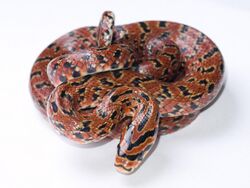Biology:Euprepiophis conspicillata
| Euprepiophis conspicillata | |
|---|---|

| |
| Scientific classification | |
| Domain: | Eukaryota |
| Kingdom: | Animalia |
| Phylum: | Chordata |
| Class: | Reptilia |
| Order: | Squamata |
| Suborder: | Serpentes |
| Family: | Colubridae |
| Genus: | Euprepiophis |
| Species: | E. conspicillata
|
| Binomial name | |
| Euprepiophis conspicillata (H. Boie, 1826)
| |
| Synonyms | |
| |
Euprepiophis conspicillata, commonly known as the Japanese forest rat snake, is a species of nonvenomous colubrid snake endemic to Japan . Its Japanese common name, jimuguri, roughly translates to "the burrower". It is closely related to Euprepiophis mandarinus, the Mandarin rat snake.
Geographic range
Euprepiophis conspicillata is native to all four main islands of Japan , including some smaller outlying islands, as well as Kunashir Island (territory disputed between Japan and Russia ).
Description
Adults are usually 70 to 100 cm (2.3 to 3.3 ft) in total length (body + tail).
Taxonomy
In recent years there has been some taxonomic controversy over the genera of rat snakes. Based on mitochondrial DNA, Utiger et al. (2002) argued for a splintering of the genus Elaphe and suggested a reworking of the genera.[4]
However, all published taxonomy remains a taxonomic suggestion until ruled on by the International Commission on Zoological Nomenclature (ICZN - http://www.iczn.org/), but that body has so far not supported the change and has not addressed the taxonomic suggestion. Thus the official taxonomy remains Elaphe.
Natural history
The Japanese forest rat snake can be found surface active at any hour, but they most often show crepuscular activity patterns. It may completely cease surface activity from mid-late summer when conditions become too hot and/or dry. Principal prey items are small rodents, and the snakes often use the rodent burrows for shelter.
As the Japanese common name suggests, this species is fossorial, and is normally associated with forested areas. Occurs from sea level to at least 3,000 m (9,800 ft).
References
- ↑ Borkin, L.; Kidera, N.; Ota, H. (2017). "Euprepiophis conspicillata". IUCN Red List of Threatened Species 2017: e.T47755805A47755812. doi:10.2305/IUCN.UK.2017-3.RLTS.T47755805A47755812.en. https://www.iucnredlist.org/species/47755805/47755812. Retrieved 17 May 2023.
- ↑ 2.0 2.1 The Reptile Database. www.reptile-database.org.
- ↑ Boulenger, G.A. 1894. Catalogue of the Snakes in the British Museum (Natural History). Volume II., Containing the Conclusion of the Colubridæ Aglyphæ. London: Trustees of the British Museum (Natural History) (Taylor and Francis, printers.) xi + 382 pp. + Plates I.- XX. (Coluber conspicillatus, pp. 51–52.)
- ↑ Elaphe obsoleta at The Center for North American Herpetology. Accessed 20 June 2008.
Further reading
- Boie, H. 1826. Merkmale eineger japanischer Lurche. Isis von Oken 19: 203–216. (Coluber conspicillatus, p. 211.)
- Duméril, A.M.C.; G. Bibron; and A.H.A. Duméril. 1854. Erpétologie générale ou histoire naturelle complète des reptiles. Tome septième. Première partie. Comprenant l'histoire des serpents non venimeux. Paris: Roret. xvi + 780 pp. (Elaphis conspicillatus, pp. 285–288.)
- Stejneger, L. 1907. Herpetology of Japan and Adjacent Territory. United States National Museum Bulletin 58. Washington, District of Columbia: Smithsonian Institution. xx + 577 pp. (Elaphe conspicillata, pp. 334–337, Figures 284–286.)
External links
Wikidata ☰ Q2630847 entry
 |


